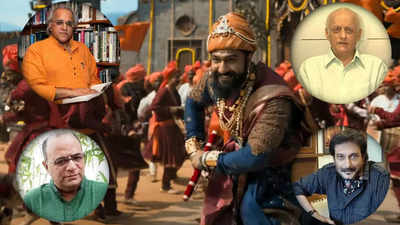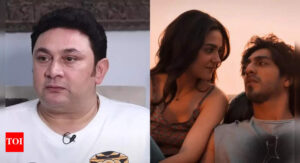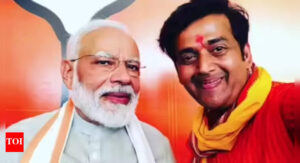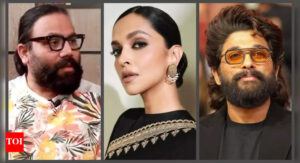The Chhaava controversy: A battle between creative liberty and historical accuracy, experts weigh in – Exclusive | Hindi Movie News
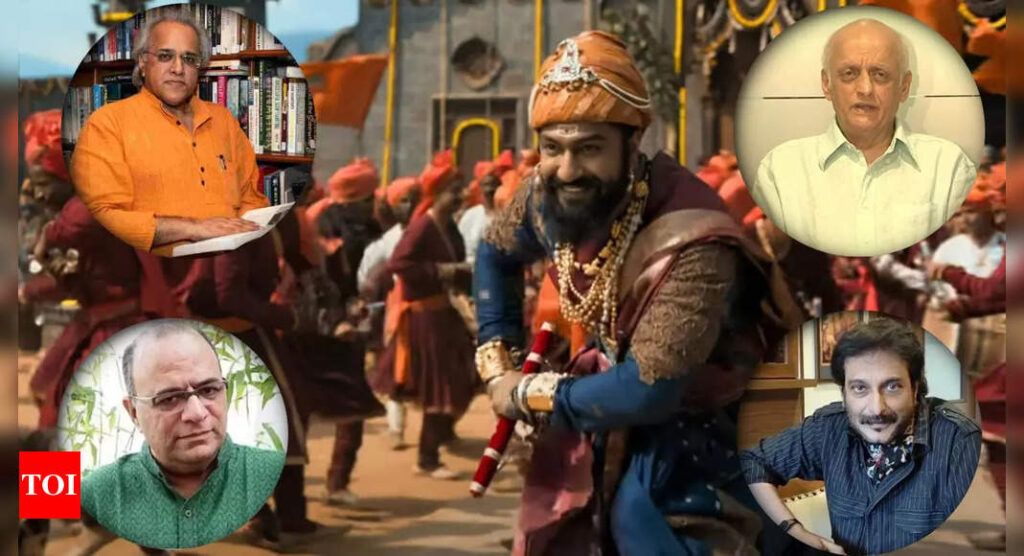
Director Laxman Utekar‘s much-anticipated historical drama Chhaava, based on the life of Chhatrapati Sambhaji Maharaj, starring Vicky Kaushal and Rashmika Mandanna, has found itself at the center of controversy. As with many historical films in recent times, debates about historical accuracy, creative liberty, and the role of social and political influences have overshadowed the artistic merit of the film.
To understand the different perspectives surrounding this issue, ETimes spoke to veteran writer Kamlesh Pandey, film historian Dilip Thakur, veteran producer Mukesh Bhatt, talented actor Milind Gunaji, trade expert Saurabh Varma, and filmmaker Dr. Chandra Prakash Dwivedi. Each of them shared their unique take on the matter, shedding light on the complexities of making historical films in India today.
“Bollywood has no real sense of history”
Veteran writer Kamlesh Pandey, known for his impactful narratives in Rang De Basanti, Tezaab, and Virrudh: Har Rishta Ek Kurukshetra, shares his perspective on Bollywood’s approach to historical figures in films.
“Filmmakers and actors do have some responsibility when portraying historical figures because these personalities hold a certain image and perception in the hearts and minds of the people. Ignoring that comes at their own cost,” Pandey asserts. “Certain liberties can be taken for the sake of storytelling, drama, and entertainment, but they must remain within the boundaries of respect and honor for the deserving historical figures.”
Acknowledging the evolving audience, he points out that sometimes, “historical personalities need to be redefined for a generation unfamiliar with them. Even then, the filmmaker’s and actor’s integrity and intention should be beyond questionable.”
However, Pandey is critical of Bollywood’s historical adaptations. “Bollywood has no real sense of history, nor does it understand how to package it in a way that resonates with contemporary audiences,” he says. “Its greed often leads to the exploitation of history, but with questionable intentions and integrity, which is why such films rarely succeed—if at all. There are only a few exceptions.”
“People seem eager to stir up controversy for attention”
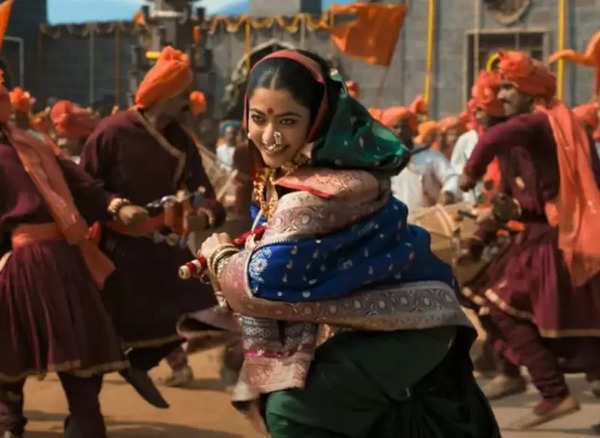
Dilip Thakur, a noted film historian, believes that historical films today are facing unnecessary controversies, largely due to the rise of social media. He points out that in earlier decades, historical films were made without major backlash.
“If you see Marathi cinema, Bhalji Pendharkar made several historical movies in the 40s and 50s. Even in Hindi, Sohrab Modi directed grand historical dramas like Pukar. These films never faced any controversy. The focus was clear—to inform and entertain. However, in today’s social media-driven era, people seem eager to stir up controversy for attention.”
Thakur further emphasizes the responsibility of filmmakers when dealing with historical content. “Filmmakers should not take creative liberties to the extent that it distorts history. Look at Bajirao Mastani—it showed Kashi Bai and Mastani dancing together, which never happened in history. While this scene was likely added for commercial value, future audiences might take it as fact.”
According to him, historical films should remain faithful to facts while maintaining artistic expression. “With advanced technology and special effects, filmmakers have the resources to make visually stunning films. But they must ensure that the narrative remains authentic.”
“Once a government-appointed body clears a film, no one should be allowed to challenge it”
Mukesh Bhatt, a veteran filmmaker, has a different view on the issue. He argues that the controversies surrounding historical films are often politically motivated rather than rooted in genuine concerns over historical accuracy.
“The real problem is not how much liberty a filmmaker takes, but how much noise fringe elements create. If a filmmaker wants to make a historical film, they should consult an officially recognized historical body to verify the script. Once this body clears the film, no political party or individual should have the right to object.”
Bhatt highlights how political groups use such controversies for their own gain. “Instead of approaching the censor board, filmmakers are forced to seek approval from political leaders like Raj Thackeray. This is unacceptable. Once a government-appointed body clears a film, no one should be allowed to challenge it.”
He also notes how the film industry’s past was different. “In the 60s and 70s, politics didn’t interfere with filmmaking the way it does today. Films like Mughal-e-Azam and Jodha Akbar took creative liberties but were still accepted by audiences.”
“Creativity is the soul of filmmaking”
Actor Milind Gunaji, who has worked in multiple historical films, shares his perspective on the responsibility that comes with portraying real-life figures on screen.
“I feel creativity is the soul of filmmaking, or for that matter, any art form. But when it comes to historical films, if the character is very well known and worshiped by people, one has to be very careful not to hurt sentiments and, as far as possible, remain factually correct with proper research while portraying those characters,” Gunaji emphasizes.
When asked about the recently deleted Lezim dance sequence from Chhaava, he expresses a pragmatic view. “Maybe the director thought it was not required and was not affecting the storytelling, so he deleted it,” he states, respecting the filmmaker’s creative decisions.
“Filmmakers should be allowed to tell stories in their own way”
Saurabh Varma, a trade analyst and film strategist, highlights another important issue: the impact of social media on the reception of historical films.
“It’s difficult to pinpoint why every big historical film faces backlash today. Social media has given everyone a platform to express opinions, and sometimes, people react negatively to a film without even watching it. For instance, Padmaavat faced massive protests, yet when people finally saw the film, they realized it wasn’t offensive.”
Drawing a striking comparison, he adds, “If K. Asif made Mughal-e-Azam today, he would almost certainly face backlash. The world has become a noisier place where everyone has a platform to voice their perceptions. Unfortunately, trolls often jump on a bandwagon mentality (bhed chaal), ignoring the actual facts or context of a film.”
Varma believes that while filmmakers and actors must exercise creative freedom, they must also be mindful of public sentiment. However, he points out that the fear of backlash is making filmmakers hesitant to explore historical subjects. “Filmmakers should be allowed to tell stories in their own way, as long as there is no malicious intent. However, with increasing sensitivities, filmmakers now hesitate to explore historical subjects, fearing backlash.”
He also dismisses the idea of drawing a rigid line between historical accuracy and cinematic storytelling, stating that “Every film has its own arcs, narrative structure, and way of storytelling. It’s challenging to define any specific precautions for something as fluid as the creative process. All kinds of content creation are becoming harder. The younger generation isn’t as inclined to visit cinemas, and creators are increasingly being bullied into not making the stories they want to tell—despite the audience having the freedom to choose whether to watch or skip a film.”
“To be politically correct is not to be historically correct”
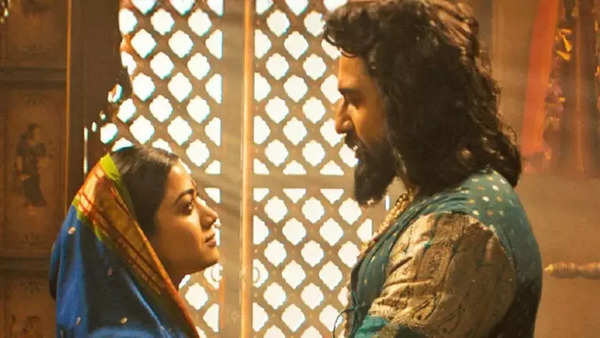
Dr. Chandra Prakash Dwivedi, a filmmaker renowned for his historical dramas, offers deep insights into the challenges of making historical films, particularly in the current socio-political climate.
“History always has multiple perspectives. When historians work on cross-references, they rely on multiple sources. Similarly, filmmakers also refer to historical books, but filmmaking operates within the framework of cinema. Producers have their own vision, and as a filmmaker, I always prioritize authenticity and drama. However, sometimes, historical accuracy doesn’t align with the producer’s expectations, leading to compromises.”
Using his film Prithviraj as an example, he explains, “There are multiple narratives about Prithviraj Chauhan. Some historians even question the existence of Sanyogita, just like Padmavati. But historians rarely protest because they understand that films are not meant to be historical verdicts—books serve that purpose. Films are meant for storytelling and entertainment.”
Dwivedi also highlights how politics influences history in cinema. “To be politically correct is not to be historically correct. There are many aspects of history that may not align with today’s moral standards. For instance, in my series Chanakya, I had referenced Krishna and Arjun ‘kidnapping’ their brides with consent. But I was advised to change the term to Varanam (choosing a groom), as ‘kidnapping’ might not sit well with modern audiences. This shows how we are constantly reshaping history to fit present-day sensibilities.”
The filmmaker further elaborates on the resistance faced by historical films, stating, “We live in a time where anything can be compromised to fit political narratives. Protest groups seldom provide historical evidence to support their claims. When I was confronted by members of Karni Sena over Prithviraj, they brought up counterarguments, but I had historical references ready on my phone. Was their claim an actual piece of evidence? No.”
He believes that filmmakers must be brave enough to face resistance and, if necessary, be ready to fight legal battles. “If there is opposition, one must be prepared to go to court, as the judiciary has the final say. Even after court verdicts, CBFC has at times hesitated to issue certificates, forcing filmmakers to fight further legal battles. But ultimately, we must follow the law, not the views of any political or social group.”
He also critiques the double standards in the scrutiny of historical storytelling. “Historical distortions on television go largely unnoticed, even when shows run for hundreds of episodes. The reason is simple—TV doesn’t bring the same level of attention as films because big stars aren’t involved. But in cinema, the moment resistance arises, filmmakers are interrogated by YouTubers, influencers, and news channels. In such cases, a filmmaker should avoid justifying themselves publicly and first wait for CBFC’s directives.”
Finally, Dwivedi advises filmmakers to be strategic about release planning. “If you anticipate resistance, you must prepare in advance. Often, filmmakers announce a release date and then rush through CBFC approvals, leaving no time for legal battles. If you suspect backlash, factor that into your timeline. In Prithviraj, people protested even before watching the film. That’s how it works today—judgments are made without even viewing the content.”
“The role of social media and political influence”
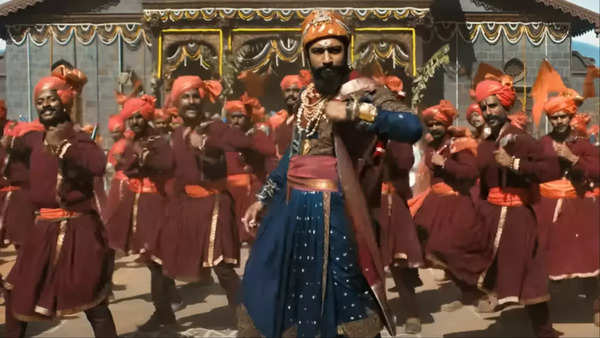
Experts agree that social media has made it easier for people to mobilize against films, often without full knowledge of the content. Political groups sometimes exploit these controversies to gain attention. This creates an environment where filmmakers are forced to self-censor to avoid backlash.
However, despite controversies, audiences continue to support historical films when the storytelling is compelling. The box office successes of Bajirao Mastani and Padmaavat prove that if a film resonates with audiences, it will overcome negativity.
The Chhaava controversy once again highlights the fine line between creative liberty and historical accuracy. While filmmakers should be free to tell their stories, they also bear the responsibility of not distorting history beyond recognition.
Ultimately, the audience holds the power. If viewers educate themselves on history and approach films with a balanced perspective, they can differentiate between fact and fiction—ensuring that history is both honored and enjoyed on the big screen.
